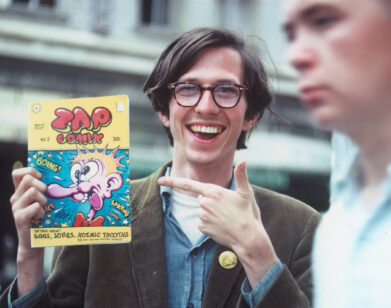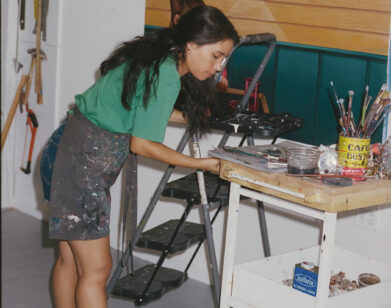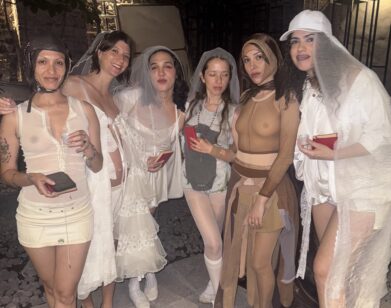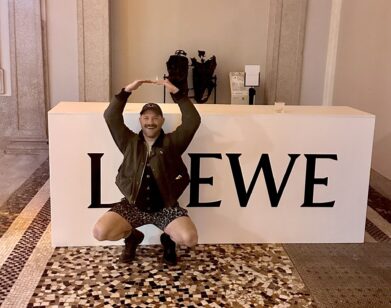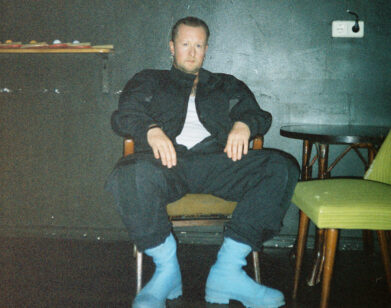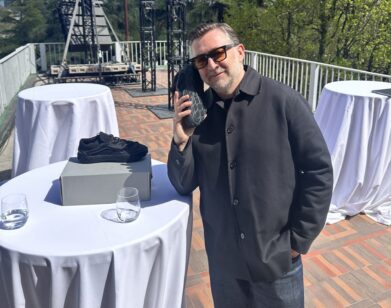Hans Ulrich Obrist Takes Time for the Manchester International Festival

Hans Ulrich Obrist is part curator, part critic, and part irrepressible mad scientist. He’s also co-director at London’s Serpentine Gallery, founder of the Museum Robert Walser and this year he’s artistic advisor, with design legend Peter Saville, of the Manchester International Festival, which runs through July 19. Obrist, Saville and MIF director Alex Poots have come up with a tour de force lineup of music, performance and visual arts exhibitions to match the city’s history of nurturing (or provoking) all things innovative, inventive and radical (lest we forget that they produced bands like Buzzcocks, Joy Division and New Order, The Smiths, The Stone Roses, Happy Mondays, among many others).
MC: At the inaugural Manchester International Festival (MIF) in 2007, there were high profile works, like the art opera you organized, “Il Tempo Del Postino,” and Chen Shi Zheng and Damon Albarn’s “Monkey: Journey to the West.” But the MIF didn’t seem to get the attention it deserved. Do you think this year will change that? And do you think Manchester will begin to rival London as an arts center, considering the amount of arts students they have here?
HUO: There’s a place in England for more cities to become centers. The MIF can be a catalyst for a stronger [art] city. Thousands of students are here, and [they’ll] see Il Tempo, Marina [Abramovic’s exhibition], Kraftwerk and Reich, etc. It’s a very big impact. You only see this a couple of years later. This is a long-term leverage. The festival has an immediate impact, a global impact but also for long-term effect. These young people will see this and it might change their life.
MC: And how has your role changed since 2007?
HUO: My role has been formalized, so I’m the artistic advisor to the festival.
MC: MIF director Alex Poots, who is head of contemporary arts at the English National Opera, is committed marrying experimental and mainstream musics, and it’s something you’re both interested in. When did you meet Poots? Do you feel he shares the same curatorial vision as you, but on the music side?
HUO: We met about four or five years ago and ever since then, we have spoken all the time. And for me, it’s a very important bridge because it’s a bridge between performance, music and [other] arts. For me, the idea of curating can be expanded. Curating science, curating art, music and theater and performance and not only bring those things into art but bring art into those areas.
MC: Is there any tenor to this year’s Festival?
HUO: Time has been such an important factor… curating within a context of a festival is curating more in time than in space and for me. We decided to do a group show in a theater, an opera, where every artist would work in time and not space. It’s a concept we had, in the context of an opera. And it’s really only the Manchester Festival that could produce this effect. Nobody else could produce it.
MC: Why is that?
HUO: There are not so many places where you could produce things that don’t fit in a box. No theaters or operas would do a show with visual artists. The situation in the Manchester Festival is very unique, which has to do with the fact that the mayor here, the leader, is unbelievably intelligent. He has done something that other cities don’t do and I can only recommend that every city should do that. He asked one of the great leading designers of the world, Peter Saville, who is from Manchester, to be their artistic director. This is strike of genius. I only wish that more politicians would understand this. It was Peter Saville that brought in the great Alex Poots. I only wish other cities would adopt this.
MC: Manchester is well known for its role in music history, particularly in the 1970s and ‘80s, which Saville was a major part of. It is obviously a place with many creative and innovative minds. Do you think this Festival will see the potentiality of the city into its future? Do you see this Festival relating to Manchester’s, or any other, history as far as innovation goes?
HUO: Music, visual art. They have their niches, their venues. For me [the Festival] is a great tribute to [British] architect Cedric Price. Price had this idea to do the Fun Palace. The Fun Palace was an idea in the 1960s, to do an interdisciplinary arts center to produce things beyond the box. You know, a project like Il Tempo would have happened in the Fun Palace. So you could say the Manchester International Festival structure makes projects happen that otherwise could not be produced. It’s more original than most festivals.
MC: Is it the only festival where 100 percent of the work is commissioned?
HUO: It’s the only one I know. At Performa in New York, there are a lot of commissions, but Manchester Festival is the only festival where everything is fully produced by the festival. MIF has created a situation that goes beyond the limits of knowledge. I think about things here which would not come to my mind elsewhere. That’s the great thing about Peter Saville and Alex Poots’ structure.
MC: How did the concept of Marina Abramovic’s live art installation “Marina Abramovic Presents…” come about?
HUO: After “Il Tempo,” we thought, “What else could we do?” It was a very free process. And we thought it could be interesting, after we brought art into the theater, if we invert the process and empty the museum, together with Maria Balshaw. Performance art has often been in the annex. It has been very marginalized. Suddenly performance art is being treated like painting or sculpture, and takes over the whole museum. Again, it was a politically radical gesture that we always wanted to do-Marina, Alex, Maria and I. Again it’s in the climate of the city—a push to the new. So in this sense I think [the Festival is in its] early days, but it’s already grown a lot since last year. The complexity has increased; at any moment, there are three or four things going on.
MC: There seems to be a lot of performances that marry pop and classical music—Antony Hegarty, of Antony and the Johnsons, performed, accompanied by the 36-piece Manchester Camerata; electro-pop pioneers Kraftwerk and American minimalist composer Steve Reich’s new 20-minute work, 2×5, (performed by New York-based Bang On A Can) were on the same bill; Rufus Wainwright, who has teamed up with director Daniel Kramer and conductor Pierre-André Valade on a new opera, ‘Prima Donna’; and Elbow will be playing with the multi-award-winning symphony Hallé Orchestra. How does your role impact this?
HUO: Alex Poots has always made a bridge between highly experimental and the mainstream. This year, Rufus Wainwright is doing an opera. And my job as artistic advisor is to bring contemporary art into the mix. And besides doing this show that we co-curated with Marina and Maria.
Then we thought it would be good to use this ecological opportunity. Alex told me about a collective called Cube, who do a lot of ecological research. We thought to work with an artist that uses ecology, and I’ve always worked with Gustav Metzger. We’re working on a big show with him at Serpentine in the fall. For me, Gustav is one of the great visionaries of our time, one of the most influential people in this country. And he’s lived more than 70 years in the UK and this country has never recognized him. He’s never really had a show in London in a public gallery. There’s never been a big institution in London that has given him a show. So, this is a very powerful year for Gustav Metzger. The sculpture [Flailing Trees in the Manchester Peace Garden] was Gustav’s idea of these trees, like a chapel or a temple. After the three weeks of the festival, it will become a permanent installation of the city. Again, it’s a time sculpture.
MC: You’ve mentioned a few times how important time is to this festival. But while a lot of work can just be seen within the context of the festival, some of the works will have a legacy or evolve into projects that will travel. Is this legacy and sustainability something that you envisioned? Is it the measure of a successful Festival?
HUO: Yes! It’s not adding another layer of event but producing sustainability and legacy.
The Festival is an amazing catalyst, it goes from Manchester to the world and also things remain in Manchester. This in not a train that comes and goes but there are layers that remain in the city. I call [the festival] M-M. ‘M’ for Manchester and ‘M’ for miracle. It can only happen here. And if can imagine, it’s only existed for two years, can you imagine what’s going to happen.

